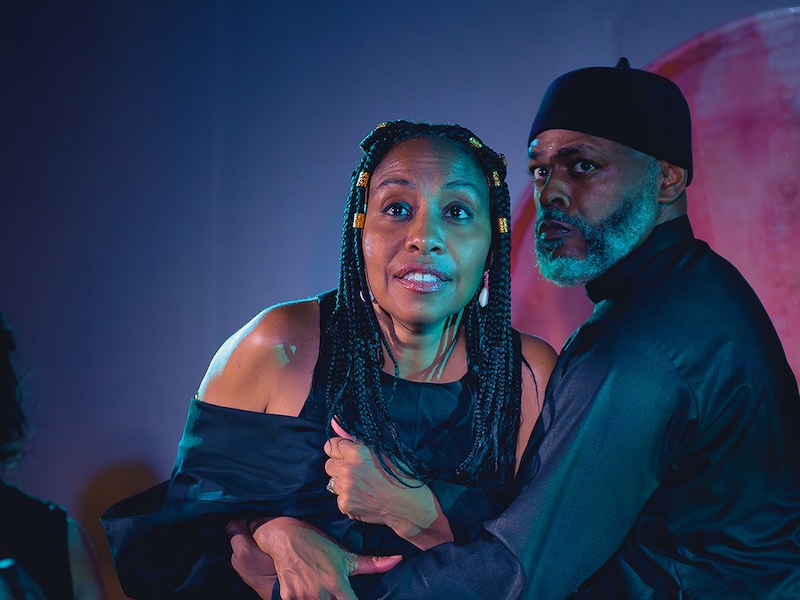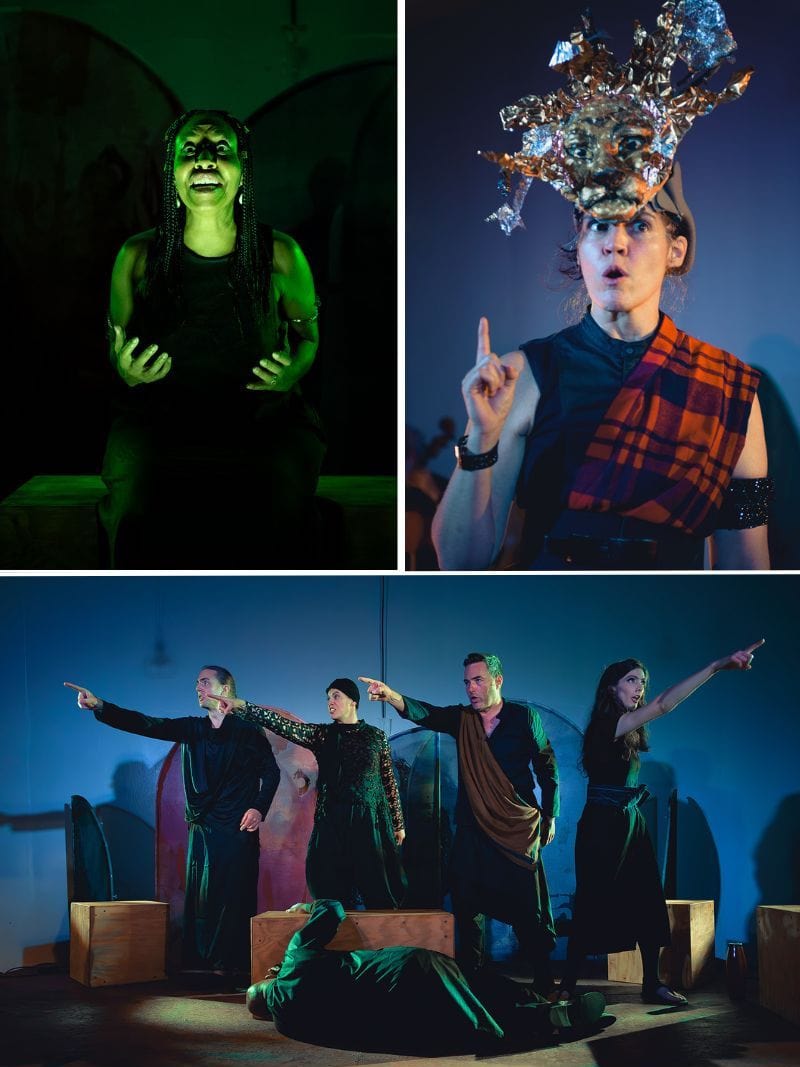I am still trying to make sense of the IN Series’ season-opening offering, Alceste. What I can say—without reservation—is that it is a phenomenally deep and satisfying work of art. The play is not just “deep” in the sense that it is emotionally charged but in the breadth of artisans who have had some part in creating the version that Timothy Nelson, as director of the play and artistic director of IN Series, brings to us in 2023.
We go back, first, to 438 B.C., where Euripides premieres his Alkestis. Fast-forward to 1749. Composer G.F. Handel writes music to accompany a contemporaneous translation of Euripides’ play, creating an opera that he calls Admeto. In 1999 Ted Hughes, husband of the late Sylvia Plath, publishes a translation of Alkestis posthumously. In our current time Plath’s poetry, along with texts by Dramaturg Sybil Roberts, round out the list of contributions to this very modern work that weaves itself together with very ancient roots.

There’s something discordant about this production. It’s a well-rounded discordance, but the implications go far beyond a superficial summary of the plot: The god Apollo tells King Admetos (KenYatta Rogers) that his wife, Alceste (Michelle Rogers), has agreed to die in order to satisfy Admetos’ debt to the gods. Admetos is horrified that she has agreed to lose her life, thus sparing his own. Alceste faces her death with bravery. Hercules—a close friend of Admetos—appears soon after Alceste has perished and things get a bit spoiler-y from then on, so we’ll stop the summary there.
The IN Series’ own INnōvatiō Orchestra (also conducted by Nelson) superbly tackles Handel, who often sounds church-adjacent to the modern ear. Handel’s high baroque style is no less churchy for this Greek play. It’s appropriate for a work so tied up in addressing the gods, along with matters of life and death. Handel’s way of making somewhat sinister events sound deceptively glorious is supported by a talented chorus. Sopranos Dawna Rae Warren and Janna Critz are joined by tenor Oliver Mercer and baritone Rob McGuinness. They’re all talented, which is a necessity when your production has music at its heart.
Discordance is something that weighs heavily on the play, which tells multiple stories at once while remaining fairly linear. It’s telling the story of Alceste, whose resolve is embodied by Michelle Rogers’ stoic yet gripping portrayal of the dying woman. Michelle’s real-life husband, KenYatta, plays Alceste’s mercurial spouse, Admetos. KenYatta is also a phenomenal actor. His Admetos is resigned, mostly, but deeply vulnerable as he comes to realize what the loss of his wife could mean. Or, rather, what the loss of a woman who processed his emotions and held his household together for him could mean.

That Plath and Hughes are involved is interesting. There’s a note in the program that says that while it is recognized that Ted Hughes was able to shape the narrative around Sylvia Plath’s death and their married life together, this work does not seek to engage that conversation. But I don’t think it can be avoided here. Alceste makes the choice to die for Admetos—perhaps the only significant choice she was ever able to make—and yet that choice is not respected. She is not respected. She is not seen except in the domestic challenges that her absence causes. Admetos, deeply upset with her decision, begs Alceste to think of her children and to think of him, and of the impact her death will have on them. Never once is she asked to think of herself and the value of her own life. Never once is Alceste allowed to recognize herself or her own feelings as being important.
This sort of coddling of the male psyche has plagued us throughout the ages. Even the resolution builds itself up around resolving Admetos’ anguish, not recognizing the agency of Alceste. I also don’t want to speak for Sylvia Plath, but I know many women who are driven to despair by the reality that the men in their lives only care about them until they begin to do literally anything that makes those men uncomfortable. There’s just no way to avoid these parallels if you know anything about the poets involved.
My interpretation is not the only interpretation, nor is it automatically the most valid because I have a platform. Trying to make sense of this ancient work that collects pieces of itself through the Baroque period, through the mid-century, and through today is what causes such an immense feeling of dis-ease. You want to see the happy ending, and yet… It ends how it should end, but how it should end makes me feel uneasy, like we missed the woman even though the play is named for her. Discordance.
Again, this production is a phenomenal work of art. You should go see it. The Rogers’ love for each other is clear in their tender and powerful portrayals of Alceste and Admetos. Maribeth Diggle is frenetic and hilarious as the loud and obnoxious Hercules. All three were well cast and clearly put their whole soul into this, as did the musicians and singers who supported them.
Alceste is a beautiful and thoughtful show, surprising in its ability to continue to challenge us when it comes to complex topics of gender and death. Part of what makes works like Alceste so important is that we can deconstruct and discuss them. We can discover what this story means to us, living right here and now. While invisible women continue to be a troubling manifestation of patriarchy, Euripides’ play is timeless because of the meaning we continue to extrapolate from it and how that meaning helps us better understand the circumstances we are experiencing in our own lives.
Running Time: Two hours, with no intermission.
Alceste presented by IN Series played September 23 and 24, 2023, in Dupont Underground, 19 Dupont Circle NW, Washington, DC, and will play at Baltimore Theatre Project, 45 W Preston St, Baltimore, MD, on September 29 and 30 at 7:30 p.m. and on October 1 at 2:30 p.m. The opera plays a final weekend of performances at GALA Hispanic Theatre, 3333 14th St NW, Washington, DC, on Saturday, October 7, at 7:30 p.m. and Sunday, October 8 at 2:30 p.m.
Ticket prices for GALA Hispanic Theatre range from $35–$65; tickets for the Baltimore Theatre Project range from $20–$30. For more information and tickets, go to www.inseries.org/post/alceste
SEE ALSO:
Timothy Nelson on the high-wire thinking behind IN Series’ ‘Alceste’ (interview by Susan Galbraith, September 7, 2023)
Alceste
Directed and Conducted by Timothy Nelson
With art by Ingrid Matthews
Michelle Rogers – Alceste
KenYatta Rogers – Admetos
Maribeth Diggle – Hercules
Featuring Dawna Rae Warren, Janna Critz, Oliver Mercer, Rob McGinness




